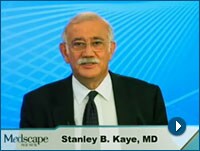Roxanne Nelson, September 30, 2013
Topic Alert
Receive an email from Medscape whenever new articles on this topic are available.
DRUG & REFERENCE INFORMATION
Topic Alert
Receive an email from Medscape whenever new articles on this topic are available.
DRUG & REFERENCE INFORMATION
AMSTERDAM — The investigational agent cediranib (AstraZeneca) can extend survival in women with recurrent ovarian cancer, according to a new study.
When given concurrently with platinum-based chemotherapy, there was an approximate 30% improvement in progression-free survival. Cediranib continued as maintenance therapy significantly improved both progression-free and overall survival.
"These are 'ground-breaking' data," said lead author Jonathan Ledermann, MD, professor of medical oncology at the UCL Cancer Institute, University College London, United Kingdom. "This is the first trial to demonstrate a significant improvement in progression-free survival and overall survival with an oral VEGF [vascular endothelial growth-factor receptor] tyrosine kinase inhibitor in ovarian cancer."
"This suggests that cediranib has a clinically meaningful role in the treatment of recurrent ovarian cancer," said Dr. Ledermann.
Cornelis van de Velde, MD, PhD, professor of surgical oncology at the Leiden University Medical Center in the Netherlands, noted that these are important results for women with recurrent ovarian cancer.
"Once the disease has recurred, there are few treatment options available that make a significant difference to its progression and to overall survival," said Dr. van de Velde, who is president of the European CanCer Organisation, in a statement.
In previous ovarian cancer trials, survival has improved with the sequential use of drugs, he explained. Most of the recent positive trials have shown an improvement in progression-free survival, but only a few have shown an improvement in overall survival.
Dr. Jonathan Ledermann
|
Dr. Ledermann presented results from the ICON6 study during a presidential session here at the European Cancer Congress 2013. Cediranib showed an incremental improvement in progression-free survival and in overall survival, he reported.
"Cediranib plus platinum based chemotherapy followed by maintenance cediranib has a statistically significant benefit over chemotherapy alone," he explained during a press briefing. "In ovarian cancer, it prolonged progression-free survival by 3.2 months and overall survival by 2.7 months."
He noted that even though the average improvement in overall survival was 2.7 months, some patients will see a much more substantial benefit.
Complex Analysis
Cediranib is a potent oral inhibitor of all 3 VEGF tyrosine kinases (VEGF-1, 2, 3), and thus blocks VEGF signaling, angiogenesis, and tumor cell growth.
Dr. Ledermann explained that cediranib has previously been shown to be active in a number of tumor types and as a single agent in ovarian cancer.
However, results from a phase 3 clinical trial of metastatic colorectal cancer indicated that cediranib is inferior to bevacizumab ( Avastin), and results from a phase 3 glioblastoma trial were disappointing.
Study Details
ICON6 is an international randomized controlled trial that involved 456 patients from 63 centers. All patients were in their first relapse after chemotherapy and surgery. "We know that if they relapse more than 6 months after completion of their first line of therapy, they will often respond very well to platinum-based chemotherapy," Dr. Ledermann told journalists.
All study participants were being treated with platinum-based chemotherapy, which consisted of platinum/paclitaxel, carboplatin/cisplatin alone, or platinum/gemcitabine for up to 6 cycles.
The primary end point was progression-free survival. Secondary end points included overall survival, toxicity, and quality of life.
Dr. Ledermann explained that "because the hazards were not proportional, we actually did a restricted means [RM] analysis, which is a slightly more complicated way of looking at the difference between the 2 curves, but this too showed an improvement of over 2 months."
When the researchers compared reference and maintenance therapy, the hazard ratio (HR) for progression-free survival was 0.57 (log-rank test P = .00001).
On RM analysis, the estimated increased time to progression was 3.2 months (from 9.4 to 12.6 months) during the 2-year follow-up period. The increase in overall survival was 2.7 months (from 17.6 to 20.3 months) (HR, 0.70; log-rank test P = .0419).
When the researchers compared reference and concurrent therapy, RM analysis showed that progression-free survival increased 2.0 months (from 9.4 to 11.4 months) (HR, 0.68; log-rank test P = .0022).
Tolerable Toxicity
Adverse events that were significantly more common in the maintenance group were hypertension, diarrhea, hypothyroidism, hoarseness, hemorrhage, proteinuria, and fatigue.
"Side effects were mostly controllable, either with dose reductions or interruptions in therapy, although some patients did need to come off treatment early because of toxicity," said Dr. Ledermann. However, adding cediranib to the treatment regimen did not compromise the chemotherapy, and most patients (>80%) were able to complete 6 cycles, he noted. In addition, most patients continued the maintenance phase until progression.
"I think this study is clinically meaningful," said briefing moderator Cora Sternberg, MD, chief of the Department of Medical Oncology and chair of the division of medical oncology at the San Camillo and Forlanini Hospitals in Rome.
Cediranib "is different from bevacizumab and has a different mechanism of action," Dr. Sternberg explained. "Tyrosine kinase inhibitors are also not purely VEGF inhibitors; they have other activity."
A patient could, therefore, become resistant to bevacizumab, which is a monoclonal antibody, and then respond to a tyrosine kinase inhibitor like cediranib, which has several different mechanisms of action. "I can actually see them used one after the other," she said.
The study was supported by the Medical Research Council and Cancer Research UK.
European Cancer Congress 2013 (ECCO-ESMO-ESTRO): Abstract LBA 10. Presented September 30, 2013.




